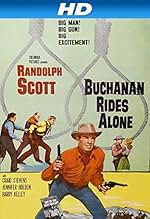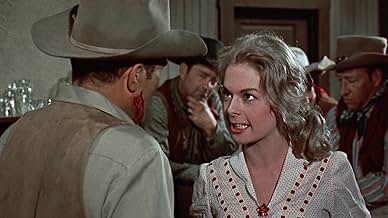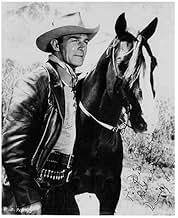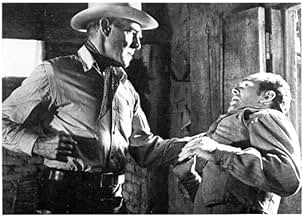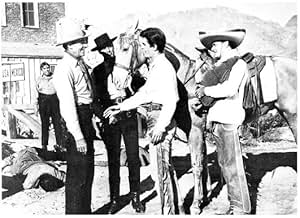IMDb रेटिंग
6.8/10
3.5 हज़ार
आपकी रेटिंग
अपनी भाषा में प्लॉट जोड़ेंTexan Tom Buchanan is heading back home with enough money to start his own ranch, but when he stops in the crooked town of Agry, he's robbed and framed for murder.Texan Tom Buchanan is heading back home with enough money to start his own ranch, but when he stops in the crooked town of Agry, he's robbed and framed for murder.Texan Tom Buchanan is heading back home with enough money to start his own ranch, but when he stops in the crooked town of Agry, he's robbed and framed for murder.
- निर्देशक
- लेखक
- स्टार
Richard Alexander
- Barfly
- (बिना क्रेडिट के)
Bill Coontz
- Townsman
- (बिना क्रेडिट के)
Tony Epper
- Townsman
- (बिना क्रेडिट के)
Duke Fishman
- Townsman
- (बिना क्रेडिट के)
Terry Frost
- Jury Foreman
- (बिना क्रेडिट के)
फ़ीचर्ड समीक्षाएं
Excellent and funny story of Agry-town, a place where everything costs ten dollars and a man can be hung for being on the right side of a fight -- but the wrong side of the law. Hypocrisy and the essential weakness of human nature are humorously juxtaposed with Scott and his friends' hardboiled masculine ethic. Only the ending is a disappointment -- rushed and somewhat confused. Lang's writing is good and very barbed but somewhat predictable as the famous Ranown cycle winds down with this film.
The Pacific Film Archive here in Berkeley CA has been showing these films for the last few years, and in 2000 I and my mother had the chance to meet the director, the very charming, funny, and intelligent Bud Boetticher, and also the people who are restoring these movies for Columbia. They're doing a wonderful job, and hopefully soon we'll all be able to enjoy restored, less yellowed prints of these classic films (especially the incredible "Seven Men from Now") on DVD. Put any pressure you can on Columbia, folks, let them know you want to see these films on DVD, because the restoration is already well underway -- we just need to let them know there's an audience out there!
The Pacific Film Archive here in Berkeley CA has been showing these films for the last few years, and in 2000 I and my mother had the chance to meet the director, the very charming, funny, and intelligent Bud Boetticher, and also the people who are restoring these movies for Columbia. They're doing a wonderful job, and hopefully soon we'll all be able to enjoy restored, less yellowed prints of these classic films (especially the incredible "Seven Men from Now") on DVD. Put any pressure you can on Columbia, folks, let them know you want to see these films on DVD, because the restoration is already well underway -- we just need to let them know there's an audience out there!
Arguably the least of the "Ranown" westerns (directed by Budd Boetticher, coproduced by Harry Joe Brown & Randolph Scott, and starring Scott) Buchanan Rides Alone eschews the thought-provoking adult premises of the other films and is satisfied being a standard potboiler devoid of deeper implications. All were shot on a modest budget but this one really looks it with a handful of drab sets and unremarkable outdoor locations. Other than Scott the cast is nondescript and the 79 minute runtime contains an inordinate amount of talking, an overly complicated narrative, and token action. However it is competently acted and professionally assembled by Budd Boetticher while existing as a proficient though unspectacular example of his work.
Tom Buchanan (Randolph Scott) rides into the mangy border town of Agry furnished with a pair of bandoliers, a money belt containing $2000, and a disarming smile. He immediately runs afoul of the corrupt local sheriff Lew Agry (Brian Kelley) who conspires to separate the stranger from his loot. Buchanan finds himself in hot water when Lou's wayward nephew Roy (Williams Leslie) gets gunned down by Juan de la Vega (Manuel Rojas) and the sheriff ropes Buchanan into the crime. They are saved from being lynched by Lew's brother Judge Simon Agry (Tol Avery), a man with political ambitions and father of Roy, who prefers to try the men in court and avoid the appearance of lawlessness. Juan is content to face the noose for his deed as Roy did something unspeakable to Juan's sister but Buchanan, pleading his innocence, is acquitted. Lew isn't satisfied with this outcome and, after confiscating Buchanan's money belt and guns, sends the unarmed man out of town accompanied by two goons who are obviously supposed to shoot him when they reach the wilderness. The plot continues to spin with plenty of intrigue including the brotherly squabble over a $50,000 ransom for Juan's life and Buchanan's efforts to retrieve his property and save the boy from the Agry clan.
Based on the novel "The Name's Buchanan" by Jonas Ward the screenplay is credited to Charles Lang but there is debate as to whom actually penned it and much of the dialogue was reportedly ad libbed on set. The fatal flaw is the characterization of Buchanan as a smiling, amiable man who seems content to have situations dictated to him. He consistently needs other people to bail him out of tough spots and displays a knack for placing himself in dire predicaments. Buchanan also exhibits a dubious personal code: he's fine seeing a woman (Jennifer Holden) get smacked, talks himself out of a hanging sentence and walks away Scott (pun intended) free content to let Juan swing, lets Lew rob him, and lies about his intentions during the climactic shootout. These are not the actions one would expect from a Randolph Scott character. Furthermore Buchanan is essentially a tumbleweed blown around by the plot; at the mercy of others and who plays a secondary role in resolving the story.
The crux of the narrative is the chess match between Simon and Lew Agry who are perpetually attempting to outwit one another for the $50,000 ransom. The villains of the piece (Lew, Simon, Roy, and henchman Waldo) - aka the White Guys - are depicted as greedy, crooked and untrustworthy while the Mexicans (Juan, Gomez, and Juan's father) are portrayed as noble and honorable. The brothers display minimal affection towards each other while Simon seems barely moved by the death of his son; instead he exploits the tragedy for financial gain. All are wily to various degrees but are quick to turn cowardly when the tables are turned against them. Agry is definitely a town you'd be wise to either pass through quickly or give a wide berth.
Directed by Budd Boetticher and lensed by the accomplished Lucien Ballard the film has a second hand look with cut-rate interiors and uninteresting location scenery. For example Simon's sprawling hacienda is reduced to a handful of drab sets giving the film a stagebound look. The narrative unfolds in a leisurely fashion with minimal tension or urgency as characters negotiate, connive, and conspire with a minimum of excitement. When events finally come to a head on a border bridge spanning the USA & Mexico and end with bodies littered everywhere it is difficult to feel satisfied as Buchanan's conflicts with Lew and Waldo are never resolved and, once again, he's more or less a bystander for the resolution. Ultimately when compared to Boetticher's other Ranown works this one resonates with a perfunctory feel as if he mailed it in. Ballard sadly falls into this category as well particularly when comparing Buchanan Rides Alone to his phenomenal work in Ride the High Country.
Randolph Scott lays on the charm in the curiously glib role; he rides into town wrapped in a pair of bandoliers for a truly badass entrance but all goes downhill quickly after that. Buchanan lets himself be pushed around, easily disarmed, and mocked on many occasions while cheerfully offering to turn over his guns to the corrupt sheriff at one point. Scott rarely seemed comfortable enacting such loquacious characters and was infinitely better as a taciturn man of action who did what needed to be done. Perhaps he and Boetticher were enamored with the prospect of trying a different approach (kudos for the attempt) but it simply doesn't work. Those expecting Scott to amble into a corrupt town and set things right will be sorely disappointed; he's more Roy Rogers than Clint Eastwood in that regard.
The supporting cast, comprised largely of undistinguished performers, are nonetheless solid. Barry Kelley handles his assignment as the despicable Lew with aplomb making him a most detestable character. Enacting his brother Simon is Tol Avery who is more subtle yet equally devious; Avery displays a tendency to be overly theatrical at times in accordance with his duplicitous character. Peter Whitney provides the yucks as the dim witted third brother Amos who spends much screen time out of breath "running around like a chicken with his head cut off" while playing his brothers off one another. Craig Stevens nabs second billing in the underwritten role of the pragmatic Carbo, Simon's bodyguard/confidant, who looks dangerous and intimidates most of the cast. The script neglects to definitively state his purpose which in turn adds some mystery to the character. Juvenile cast members LQ Jones and Manuel Rojas give the film plenty of heart as the amiable Pecos and the hotheaded yet righteous Juan, respectively.
In sum Buchanan Rides Alone is a curious mixture whose provocative title doesn't justify the activity in the film. The plot is overly complicated and too much time is devoted to its mechanizations at the expense of action. Compared to the other works by genre studs like Budd Boetticher, Lucien Ballard, and Randolph Scott this effort seems tossed off with the intention of making a profit rather than suitably entertaining its audience. Still it goes by quickly and is worth a viewing for fans of the big names involved in the production.
Tom Buchanan (Randolph Scott) rides into the mangy border town of Agry furnished with a pair of bandoliers, a money belt containing $2000, and a disarming smile. He immediately runs afoul of the corrupt local sheriff Lew Agry (Brian Kelley) who conspires to separate the stranger from his loot. Buchanan finds himself in hot water when Lou's wayward nephew Roy (Williams Leslie) gets gunned down by Juan de la Vega (Manuel Rojas) and the sheriff ropes Buchanan into the crime. They are saved from being lynched by Lew's brother Judge Simon Agry (Tol Avery), a man with political ambitions and father of Roy, who prefers to try the men in court and avoid the appearance of lawlessness. Juan is content to face the noose for his deed as Roy did something unspeakable to Juan's sister but Buchanan, pleading his innocence, is acquitted. Lew isn't satisfied with this outcome and, after confiscating Buchanan's money belt and guns, sends the unarmed man out of town accompanied by two goons who are obviously supposed to shoot him when they reach the wilderness. The plot continues to spin with plenty of intrigue including the brotherly squabble over a $50,000 ransom for Juan's life and Buchanan's efforts to retrieve his property and save the boy from the Agry clan.
Based on the novel "The Name's Buchanan" by Jonas Ward the screenplay is credited to Charles Lang but there is debate as to whom actually penned it and much of the dialogue was reportedly ad libbed on set. The fatal flaw is the characterization of Buchanan as a smiling, amiable man who seems content to have situations dictated to him. He consistently needs other people to bail him out of tough spots and displays a knack for placing himself in dire predicaments. Buchanan also exhibits a dubious personal code: he's fine seeing a woman (Jennifer Holden) get smacked, talks himself out of a hanging sentence and walks away Scott (pun intended) free content to let Juan swing, lets Lew rob him, and lies about his intentions during the climactic shootout. These are not the actions one would expect from a Randolph Scott character. Furthermore Buchanan is essentially a tumbleweed blown around by the plot; at the mercy of others and who plays a secondary role in resolving the story.
The crux of the narrative is the chess match between Simon and Lew Agry who are perpetually attempting to outwit one another for the $50,000 ransom. The villains of the piece (Lew, Simon, Roy, and henchman Waldo) - aka the White Guys - are depicted as greedy, crooked and untrustworthy while the Mexicans (Juan, Gomez, and Juan's father) are portrayed as noble and honorable. The brothers display minimal affection towards each other while Simon seems barely moved by the death of his son; instead he exploits the tragedy for financial gain. All are wily to various degrees but are quick to turn cowardly when the tables are turned against them. Agry is definitely a town you'd be wise to either pass through quickly or give a wide berth.
Directed by Budd Boetticher and lensed by the accomplished Lucien Ballard the film has a second hand look with cut-rate interiors and uninteresting location scenery. For example Simon's sprawling hacienda is reduced to a handful of drab sets giving the film a stagebound look. The narrative unfolds in a leisurely fashion with minimal tension or urgency as characters negotiate, connive, and conspire with a minimum of excitement. When events finally come to a head on a border bridge spanning the USA & Mexico and end with bodies littered everywhere it is difficult to feel satisfied as Buchanan's conflicts with Lew and Waldo are never resolved and, once again, he's more or less a bystander for the resolution. Ultimately when compared to Boetticher's other Ranown works this one resonates with a perfunctory feel as if he mailed it in. Ballard sadly falls into this category as well particularly when comparing Buchanan Rides Alone to his phenomenal work in Ride the High Country.
Randolph Scott lays on the charm in the curiously glib role; he rides into town wrapped in a pair of bandoliers for a truly badass entrance but all goes downhill quickly after that. Buchanan lets himself be pushed around, easily disarmed, and mocked on many occasions while cheerfully offering to turn over his guns to the corrupt sheriff at one point. Scott rarely seemed comfortable enacting such loquacious characters and was infinitely better as a taciturn man of action who did what needed to be done. Perhaps he and Boetticher were enamored with the prospect of trying a different approach (kudos for the attempt) but it simply doesn't work. Those expecting Scott to amble into a corrupt town and set things right will be sorely disappointed; he's more Roy Rogers than Clint Eastwood in that regard.
The supporting cast, comprised largely of undistinguished performers, are nonetheless solid. Barry Kelley handles his assignment as the despicable Lew with aplomb making him a most detestable character. Enacting his brother Simon is Tol Avery who is more subtle yet equally devious; Avery displays a tendency to be overly theatrical at times in accordance with his duplicitous character. Peter Whitney provides the yucks as the dim witted third brother Amos who spends much screen time out of breath "running around like a chicken with his head cut off" while playing his brothers off one another. Craig Stevens nabs second billing in the underwritten role of the pragmatic Carbo, Simon's bodyguard/confidant, who looks dangerous and intimidates most of the cast. The script neglects to definitively state his purpose which in turn adds some mystery to the character. Juvenile cast members LQ Jones and Manuel Rojas give the film plenty of heart as the amiable Pecos and the hotheaded yet righteous Juan, respectively.
In sum Buchanan Rides Alone is a curious mixture whose provocative title doesn't justify the activity in the film. The plot is overly complicated and too much time is devoted to its mechanizations at the expense of action. Compared to the other works by genre studs like Budd Boetticher, Lucien Ballard, and Randolph Scott this effort seems tossed off with the intention of making a profit rather than suitably entertaining its audience. Still it goes by quickly and is worth a viewing for fans of the big names involved in the production.
The fourth collaboration between Boetticher and Scott does not quite measure up to its predecessors but is enjoyable enough. Scott plays an easy-going stranger passing through a town run by a dastardly family. Of course, he has a run-in with the family and ends up in jail. Stevens, who played Peter Gunn on a popular TV series that started the same year as this film came out, plays a somewhat shady character here. L.Q. Jones, who made a career out of playing nasty villains, gets to play a clean-cut good guy here. Unlike the previous films in this series, this one has no female characters; it would have perhaps benefited from having a love interest for Scott.
Making his way home to Texas, Tom Buchanan stops off at the little town of Agry for rest and refreshments. Quickly finding that the town is run by the family Agry itself, Buchanan falls foul of one of them straight away. His problems are further compounded when he steps in to stop a young Mexican from taking a beating. Something that finds him on the end of a rope with things looking rather grim.
How you fare with Buchanan Rides Alone may depend on how many (if any) Budd Boetticher and Randolph Scott collaborations you have seen prior. For this adaptation of Jonas Ward's novel "The Name's Buchanan" is lighter in tone than their other well regarded pieces. Not to decry this as a standalone picture of course, but although it's part of the "Ranown" cycle, it's a long way from the more "Adult Western" richness of The Tall T, Ride Lonesome and Comanche Station for example. Conversely the other way is also true, if this is the first one you sample from the duo, and you enjoy it, well you may not take to the deeper themed, harsher other films in their cannon.
Buchanan Rides Alone gets in a does a job without any fuss or boring filler play. Randolph Scott as Buchanan clearly is enjoying adding a bit of comic zip to proceedings, with Boetticher evidently happy to keep things smooth for the one hour and twenty minutes running time. Fine support comes from Barry Kelley, Tol Avery and the irrepressible L.Q. Jones, whilst Lucien Ballard was the obvious and right choice to photograph the Old Tuscon location. Not one to take too seriously, but enough drama to keep one interested, and certainly one that gives notice to what a fine and undervalued performer Randy Scott was. 6.5/10
How you fare with Buchanan Rides Alone may depend on how many (if any) Budd Boetticher and Randolph Scott collaborations you have seen prior. For this adaptation of Jonas Ward's novel "The Name's Buchanan" is lighter in tone than their other well regarded pieces. Not to decry this as a standalone picture of course, but although it's part of the "Ranown" cycle, it's a long way from the more "Adult Western" richness of The Tall T, Ride Lonesome and Comanche Station for example. Conversely the other way is also true, if this is the first one you sample from the duo, and you enjoy it, well you may not take to the deeper themed, harsher other films in their cannon.
Buchanan Rides Alone gets in a does a job without any fuss or boring filler play. Randolph Scott as Buchanan clearly is enjoying adding a bit of comic zip to proceedings, with Boetticher evidently happy to keep things smooth for the one hour and twenty minutes running time. Fine support comes from Barry Kelley, Tol Avery and the irrepressible L.Q. Jones, whilst Lucien Ballard was the obvious and right choice to photograph the Old Tuscon location. Not one to take too seriously, but enough drama to keep one interested, and certainly one that gives notice to what a fine and undervalued performer Randy Scott was. 6.5/10
I'm familiar with Scott's work and am a fan. This film doesn't quite fit in with films like The Tall T, Ride Lonesome, Decision at Sundown etc. Scott shares the screen with lots of supporting characters- LQ Jones, Craig Stevens and all the Agry men. The film opens with Scott happily heading to West Texas via Agry after a profitable Mexican run. He just wants food, probably something of a binding nature and drink. What no women? Only one woman here of interest- Barbara James uncredited as Nina the judge's Mexican housekeeper. Scott has barely any interaction with any females-Jennifer Holiday. Our Scott stands for loyalty, bravery, a fair fight, love of your belt, gun and Texas. I'll give him that. There is no compelling villain here as the Agry's are a bunch of double dealing B movie bumblers. Amos Agry reminds me of a young Andy Devine. Scott is good as a very relaxed murder defendant in a back barroom courtroom. This flick therefore falls toward the lower rung of the RS canon IMHO. I'd see it again, but I'd be riding lonesome.
क्या आपको पता है
- ट्रिवियाJonas Ward wrote the novel this film is based upon. There are more than 20 other novels about the drifter Tom Buchanan. The first one is "My Name is Buchanan."
- गूफ़The story is supposed to be set in the California border town of Agry but the landscape is populated with the Sahauro cactus which only exist north of the Mexican border in the Sonoran Desert where it extends into Southern Arizona and the very distinctive jagged volcanic peaks of the Tucson Mountains are ever present in the background.
- भाव
Pecos Hill: Well, what are we going to do now?
Tom Buchanan: First tie him up. Then fix us some food, Then... I'm not sure.
- कनेक्शनFeatured in Budd Boetticher: A Man Can Do That (2005)
टॉप पसंद
रेटिंग देने के लिए साइन-इन करें और वैयक्तिकृत सुझावों के लिए वॉचलिस्ट करें
- How long is Buchanan Rides Alone?Alexa द्वारा संचालित
विवरण
- रिलीज़ की तारीख़
- कंट्री ऑफ़ ओरिजिन
- भाषाएं
- इस रूप में भी जाना जाता है
- The Name's Buchanan
- फ़िल्माने की जगहें
- उत्पादन कंपनियां
- IMDbPro पर और कंपनी क्रेडिट देखें
- चलने की अवधि1 घंटा 20 मिनट
- पक्ष अनुपात
- 1.85 : 1
इस पेज में योगदान दें
किसी बदलाव का सुझाव दें या अनुपलब्ध कॉन्टेंट जोड़ें



